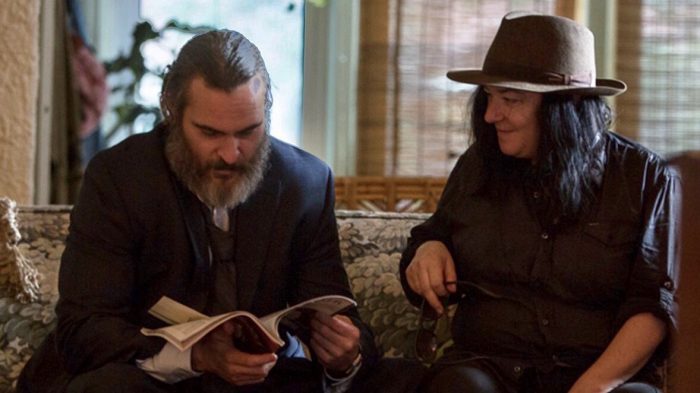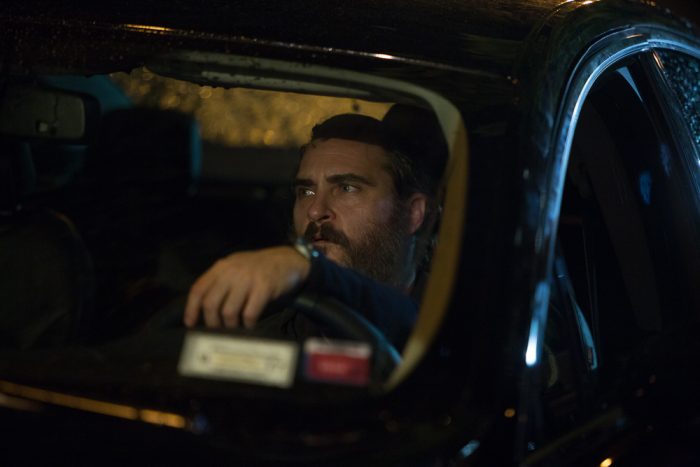Lynne Ramsay On Defying Clichés In 'You Were Never Really Here' And Her Thoughts On Joaquin Phoenix As The Joker [Interview]
Lynne Ramsay was never really trying to break the mold. The director of this year's critical darling You Were Never Really Here chooses her movies with discretion, with a six-year gap between the Joaquin Phoenix-starring noir thriller and her last film, the haunting psychological drama We Need to Talk About Kevin. Only four feature films total populate Ramsay's entire catalogue, each of them critically beloved, each of them inflicting a different kind of violence upon the audience. "We've seen a lot of violence in film that it's become almost banal," Ramsay told /Film in an interview ahead of You Were Never Really Here's digital release on the Amazon Prime streaming platform. "It's actually more scary not to show it."
That's the genius of You Were Never Really Here, a taut and moody thriller centering around Phoenix's PTSD-suffering hit man who rescues trafficked girls. In other hands, the film would paint Phoenix as a glamorous lone wolf, an anti-hero who beats down societal corruption with his bare fists. But in Ramsay's hands and in Phoenix's gaunt, weary performance, You Were Never Really Here shows us a different kind of anti-hero.
Here is what Ramsay had to say about defying the "knight in shining armor" clichés, Phoenix's role in shaping the character of Joe, and what Ramsay thinks about Phoenix's current role as the Joker.
 You Were Never Really Here has been frequently compared to Taxi Driver since its theatrical release. Did you go into the film intending those parallels or was that something that grew organically out of the story?
You Were Never Really Here has been frequently compared to Taxi Driver since its theatrical release. Did you go into the film intending those parallels or was that something that grew organically out of the story?
I'm flattered by those comparisons because Taxi Driver is a great film, it's a masterpiece. But I wouldn't say it was intentional.
You said in an interview before that Joaquin Phoenix's character Joe is "the opposite of a knight in shining armor. He can't even save himself." So many films have glorified the kind of lone wolf hero that he plays in You Were Never Really Here, but the film manages to subvert and sidestep that. How would you say you accomplished that unglorified approach?
Well [You Were Never Really Here is] based on the novella by Jonathan Ames, who crafted an incredible story. But we were definitely not interested in doing the clichés of the trope. Nina just as much saves herself as Joe saves her. We just try to break all these clichés that you've seen in a lot of films that have, like you said, the lone wolf. This is a different kind of character, I think it's a character more defined by his post-traumatic stress syndrome. And I think his heart's in the right place with Nina, but he gets sent down this rabbit hole, and that brings him back to life in a way. It's a film about this character more than anything.
Another trope that this film plays into but never surrenders to is that of the stoic male savior and the innocent young girl rescued by him. How did you make sure that the film never falls victim to that trope?
Well, it was something I was really aware of right from the beginning. It was something I wanted: that at the end, she saves herself and him. That was something that I felt like it's not interesting to go that [typical] route, I thought it was more interesting to defy that route. It's something I was very conscious of from the beginning.
Do you think as a female director you had a unique approach that leant to this film's unglamorous portrayal of the lone male antihero?
I don't know. As a filmmaker I think it's just a coincidence that any studio that bears responsibility didn't reject me. But you know probably as a woman, there aren't a lot of chances to do a noir film. To explore a character and structure like that...I don't know if I can speak as a woman but I think I've managed to avoid the clichés of the knight in shining armor. That's a hard question, actually.
I know, it's pretty loaded.
Break those chains. [Laughs]
One of the remarkable things about the movie is how restrained the violence is. We see the aftermath of Joe's rampages, but never the doing. And in your previous movie We Need to Talk About Kevin, the violence is also mostly offscreen. So would you say that you intentionally avoid graphic violence as an aesthetic choice?
It's funny that you say that. I'm not a fan of openly violent films that are violent in a costume kind of way. Funnily enough people find my films, especially in respect to [We Need to Talk About Kevin], as something akin to a horror film. What they imagine I think is much more "costume" than what it would seem. So it's kind of been funny the reactions of people because they come out quite shaken by both films and yet what you see isn't [that violent]. I guess it's a choice I believe of what shakes you and what doesn't, and also what makes you feel a certain way. And we've seen a lot of violence in film that it's become almost banal. It's actually more scary not to show it. I guess that was a choice as a filmmaker, yes: to play with this subconscious effect of what you don't see and the stuff that is like the darkness inside that violence that you...imagine. It's much more disturbing in a way, and makes you question yourself a bit more.
 You mentioned before that some people compared your films to a horror film. Would you be interested in doing a horror film?
You mentioned before that some people compared your films to a horror film. Would you be interested in doing a horror film?
Yes. It would probably be my kind of psychological horror film, but yeah definitely. Horror is a genre where you explore a lot of fears. I look at all films as a kind of amateur psychologist. One of my favorite films, The Shining, is a horror film but it's also a film about a man having a breakdown. So yeah, I definitely would. I think I might be writing a horror film at the moment. [Laughs]
Oh, can you give a hint at what that film is you're writing?
Ah, it's just something I'm writing with my friend here [in Mexico]. I've told you as much as I can, but I'm excited for it, we've written about 160 pages. But I can't say too much at the moment. But I'd love to work with Joaquin again on it.
Speaking of Joaquin, his physicality plays a major part in You Were Never Really Here. Did you discuss with him beforehand how he would build his body to build his character?
Well when it came time that we were able to prep, I don't know when he put it in motion, but he started building up and becoming almost this Hunchback of Notre Dame. It was like this armor [through which] we learn there's something much more vulnerable about him than we see. But that in a way is more frightening I think. He changed [his body to the point] where it started feeling right: something that you can react to in the character — the way he walked, his physical appearance. Yeah, so he made those [decisions] when we were prepping. But having him there was really valuable in picking away at those clichés. It was a really exciting film to shoot, because there was a lot of, "With Joe, how funny, how terrifying [do we want him to be]?" Sometimes I feel like we put the devil in him, you know? I'll always be grateful to the way he changed so heavily.
What do you think of Joaquin taking on the role of the Joker?
I think he's amazing, I'd love to direct that myself. It's a real psychological character, I loved The Dark Knight Returns when I was a kid. I think if anyone's going to play the Joker, he's the right guy. All those facets of his character, I think it'll be awesome. I think they're still shooting at the moment so he's still very inside the character. I've never seen someone who so inhabits the role, to watch him even in the first few days that we shot [You Were Never Really Here], it was just kind of like meeting the character. I think he's got great instinct and I love to work on instinct. If something goes wrong I think you should avoid it, and I think he works the same way.
This interview has been edited and condensed.
